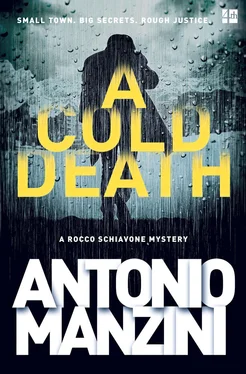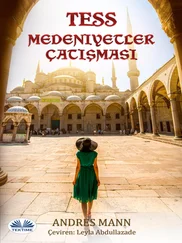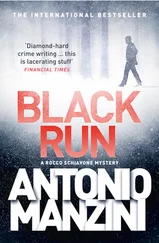Rocco stood up and shook hands.
“Come in, have a seat.”
Standing next to the bookshelf, a young man in jacket and tie was gathering a series of enormous file folders full of documents. “Let me introduce you to Judge Messina. Aldo, this is Deputy Police Chief Schiavone, who’s been working with us for just a few months but has already solved one case brilliantly. Am I right?”
Judge Messina was obliged to set down his armful of folders so he could shake hands with Rocco. “I’ve heard a lot about you,” he said, with unmistakable emphasis.
“And you still shake my hand?”
Messina smiled. “I wouldn’t refuse to shake anyone’s hand. If you’ll excuse me.” He gathered up his folders again and left the room. The first thing that Rocco Schiavone noticed was that the photograph of the judge’s wife was now gone from the desktop. The last time he’d seen it, the picture had been lying facedown. Now he felt certain it was tucked away in one of the desk drawers. That’s always a bad sign. The magistrate’s marriage was on its way out. The eve of the final breakup. Baldi swept his blond bangs out of his eyes with a quick flick of the hand and sat down at his desk. “Now then, what news do you have for me about what happened on Via Brocherel?”
“It was a murder. I’m sure of it. Esther Baudo—that’s the victim’s name—was beaten and then strangled. The hanging seems to me to have been staged. Plus, the room where we found the corpse was dark, with the shutters down. But when I walked in and I turned on the light, there was a short circuit. Which means that the woman hanged herself in the dark …”
“Or else, after she hanged herself, someone lowered the blinds. Right?”
“Exactly.”
“So what’s your theory?”
“I don’t have one, Dottore. I’m still just sniffing around.”
Baldi stretched both arms in the air. “And do you like what you smell?”
“Smells like shit, as usual.”
“The husband?”
“He’s a sales representative, works in athletic equipment. Clean record, no run-ins with the law, a traffic ticket or two. But something was stolen.”
The judge nodded, thoughtfully. “Burglars caught in the act who then decided to stage the whole thing?”
Rocco shrugged. “Why not? Maybe they did it just to throw us off the trail. Still, there’s something about it I don’t like.”
“Do tell.”
“Actually, two things. The first thing, you see, is that we have a kitchen that was turned literally upside down, like there’d been a tornado. A real authentic mess. But the bedroom, where the valuables were hidden—in a small velvet box containing the family gold—was searched scientifically. They might have opened a couple of drawers, at the very most.”
“As if they knew where to look. So what about the mess in the kitchen?”
“Exactly. It doesn’t add up. Plus, I think the burglars had been in that apartment before.”
“Why do you say that?”
“There was no sign of breaking and entering on the door or on the windows. If they got in, either it was because Signora Baudo knew them or else because—”
“Because they had the keys,” concluded Judge Baldi, getting to his feet. He was hyperactive: he couldn’t sit listening for more than five minutes at a time. He walked over to the window and stood drumming his fingers on the glass. “I’m afraid you’re going to have to work solo, Schiavone. I’ve got some problems on my hands.” Immediately an image flashed into Rocco’s mind: the wife’s picture dumped into a drawer, if not actually tossed in the trash. Baldi stopped drumming and started whistling softly. Rocco recognized the Toreador song from Bizet’s Carmen . “We are on the trail of one of the biggest tax evasion cases I’ve ever worked on, me and the finance police and the Carabinieri. There’s just an endless supply of tax evaders, you know that?”
“I can imagine. I can’t do a lot of tax evading with my paycheck.”
Baldi turned around and smiled. “If we all just paid our taxes, the tax burden would be much lighter. You know that, I know that. But it seems as if the Italians aren’t interested in the fact. This really is a strange country, isn’t it?”
Rocco braced himself for another pearl of wisdom from Judge Baldi, who always seemed to have some solution for the nation’s political and economic problems on his mind. His notions ranged from drafting cabinet ministers and secretaries from other countries, more or less the way that soccer teams are assembled, in order to have serious, well-trained, honest people running the government, to the elimination of banknotes so that all transactions would have to be conducted through credit cards. This would make all purchases traceable and make it impossible to conceal one’s income and evade taxes. “It’s a strange, deeply wasteful country,” Rocco said, encouragingly.
Baldi didn’t have to be asked twice. “True. Let me give you an example. Public funding of the political parties. Right now, they take the money as an electoral reimbursement, right?”
“Right.”
“And I don’t actually disagree with the idea. Better for them to receive public money than get funds from some powerful, manipulative lobbyist or other. But follow me closely here.” He turned away from the window and went back to his seat at his desk. “I say what we do is take parliamentarians, cabinet ministers, and undersecretaries off the state payroll, because that’s clearly a waste of public money. Instead, we should have deputies, senators, and everyone else paid directly by the parties that run them for office. In that case, politicians would get the proper salaries. And just think of how much money the treasury would save. What do you think? Wouldn’t it be a great idea?”
“But that would mean finally just giving up and bending over to take it from behind, and admitting that this country is in the hands of the political parties.”
“Well, are you saying it isn’t? Deputies and senators, commissioners and outside consultants, none of them are civil servants, Schiavone. They’re servants of the parties they belong to. And in that case, let the parties pay them!”
Rocco raised his eyebrows. “I’d have to give that some thought.”
“By all means, Schiavone. Think it over. And please, help me understand what happened to Esther Baudo. I leave that case in your hands. After all, it’s clear that I can rely on you.”
Baldi’s expression had changed. Now a sinister light glittered in his eyes.
“Of course I can rely on you.”
The magistrate’s mouth stretched out in a false, menacing smile. “And since I want to rely on you, look, I’d really like to get your version.”
“My version of what?”
“Of what happened in Rome.”
Oh my God, what a pain in the ass, thought Rocco, but he kept it to himself. “You know everything that happened; there are reports and documentation. I’m sure you’ve read them. Why dig into it again?”
“It seems to be an occupational hazard with me. I’d just like to hear your version. You’ve been here for six months now. You can tell me, can’t you?”
“All right then.” Rocco took a deep breath, got comfortable, and began. “Giorgio Borghetti Ansaldo, age twenty-nine, had a bad habit: he liked to rape young girls. I followed him, I stopped him, but there was nothing I could do about him. It just so happens that his father, Fernando Borghetti Ansaldo, is the undersecretary for foreign affairs. You may have seen his name in the news.”
Baldi nodded, brow furrowed in concentration.
“Okay. Giorgio didn’t shake his bad habit, and he kept it up until one day he practically killed a certain Marta De Cesaris, age sixteen, who lost her sight in one eye; a hundred years of therapy will never turn her back into the pretty, carefree high school student who attended the Liceo Virgilio in Rome. So I finally had my fill, I went to see Giorgio, and I gave him a serious beat-down.”
Читать дальше












